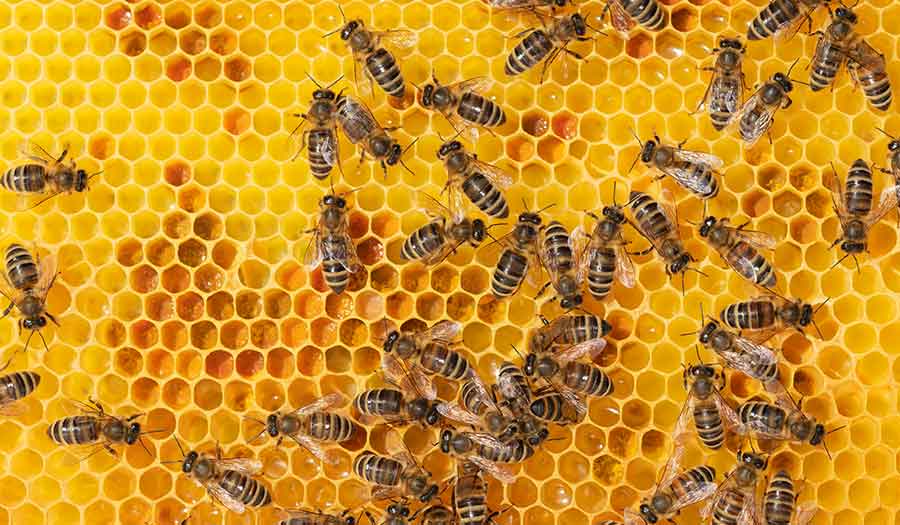 Getty Images
Getty Images
Article
Learn the why behind the headlines.
Subscribe to the Real Truth for FREE news and analysis.
Subscribe NowBees have become so valuable that beekeepers are having their hives stolen. In late January, the Fresno County, California, Sheriff reported that nearly 100 beehives, valued at $34,000, were stolen from an almond grove.
The importance of bees cannot be overstated. According to the United States Department of Agriculture (USDA), 4,000 bee species pollinate 15 billion dollars in agricultural products in the U.S. annually, including 130 different species of food crops. Their numbers have declined significantly since the start of the century.
The many reasons for this decline include loss of habitat, land use changes, pesticide use, disease and parasites. According to scientists, they are affected by the “4Ps”: parasites, pathogens, poor nutrition and pesticides.
Threats to Bees
Insecticides in recent years have come under fire for being toxic to humans and animals, as well as having unintended consequences for other insects.
For example, Fipronil is a broad-spectrum chemical insecticide that disrupts the insect central nervous system. It’s generally used to control ants, beetles, cockroaches, fleas, ticks and termites. In 2018, it was confirmed that Fipronil is highly toxic to bees and that, when used, it contaminates the pollen they collect.
Unfortunately, the pesticide is still in wide use and killed more than 3 million bees last September in San Diego.
Other severe threats to colonies include African and yellow-legged hornets—sometimes referred to as “murder hornets”—as well as several species of mites and numerous bacterium.
Although honey bees have seen a slight resurgence, their numbers are still down significantly. Native bees, responsible for most of the pollinating, have not seen this recovery.
Biologists have stepped in. They are actively breeding bees exhibiting more resistance to the major factors responsible for the species’ decline.
Lanie Bilodeau, research leader at Honey Bee Breeding, Genetics, and Physiology Research lab in Baton Rouge, Louisiana, explained, “We are breeding honey bees that are more efficient at processing nutrients in their food and are more resistant to pests, pathogens and pesticides…Developing healthier and more productive honey bee colonies will help ease the effects of disease and climate change, and improve the food supply at local, national and global scales.”
Restricting the Use of Insecticides to Protect Populations
Most states restrict the use of certain chemicals alongside the Environmental Protection Agency. Such restrictions protect populations of primary pollinators. While bees handle approximately 75 percent of the fruits, nuts, and vegetables grown in the United States, they are not alone. Butterflies, birds, bats and even mosquitoes share pollinating duties.
Homeowners can only use certain chemicals considered “more safe” for novices to administer. Licensed commercial applicators have access to a greater number of products. But they, too, are regulated in the timing of applications on specific crops.
Commercial applicators practice a process known as Integrated Pest Management (IPM). This practice accounts for various factors, such as using the “scouting calendar” to assess the need to spray in relation to the potential economic damage of a pest.
When pest populations grow larger than is economically viable, spraying begins. An applicator can spray most fungicides on crops before or during spring leaf and flower budding. Insecticides should not be sprayed during the few days the flowers are open to preserve pollinators.
What Crops Do They Pollinate?
According to the USDA, pollinators add more than $18 billion in revenue to crop production every year. Bees are almost solely responsible for pollinating 130 crops, such as apples, peaches, blackberries, blueberries and pears. They are also essential for nut pollination, like almonds.
Almonds are dependent on bees for pollination since they are not self-pollinating.
To assist farmers’ pollination requirements, beekeepers transport hives seasonally from one location to another. According to estimates, commercial beekeepers relocate 70 percent of the U.S. commercial bee population during almond flowering to pollinate California’s vital and lucrative crop.
Hives are transported to northern regions in March and April to pollinate apples, cherries, apricots and peaches. The hives head south in the late winter to assist with peach, orange and grapefruit pollination. Some companies specialize in beehive relocation.
In recent years, there have also been several efforts to build mechanical drones to ease the strain on the bee population.
Are They Important for Humans Besides Being Pollinators?
Aside from preventing human extinction with their pollinating skills, bees offer other benefits.
Bees produce honey from the nectar they take from the flowering plants they pollinate. This sweet, semiliquid substance has valuable health properties.
Karen Kelly, a certified health coach from Seasonal Cravings, says, “Honey is rich in antioxidants, including flavonoids and phenolic acids, which help repair cell damage. Some studies even show that it can reduce the risk of heart disease and diabetes. Honey is a crop many humans enjoy and a healthy addition to your diet. Add a drizzle to your oatmeal or morning tea for a nutritional boost.”
Honey is generally safe for humans to consume. But do not give even a tiny bit to infants under one. It causes a rare yet severe gastrointestinal condition (infant botulism) caused by Clostridium botulinum spores in the honey.
Due to the decline of the bees, many homeowners have started beekeeping in their backyards as a hobby.
This article was produced by Media Decision and syndicated by Wealth of Geeks.
- Real Truth Magazine Articles
- ANALYSIS
 Extinction Crisis: 1 Million Species Under Threat
Extinction Crisis: 1 Million Species Under Threat
Other Related Items:
More on Related Topics:
- India’s Capital Chokes as Air Pollution Levels Hit 50 Times the Safe Limit
- Record-setting Dry Conditions Threaten More U.S. Wildfires, Drinking Water Supplies
- Death Toll from Spanish Floods Climbs as Shock Turns to Anger and Frustration
- Residents Slog Through Flooded Streets, Clear Debris After Hurricane Milton Tore Through Florida


